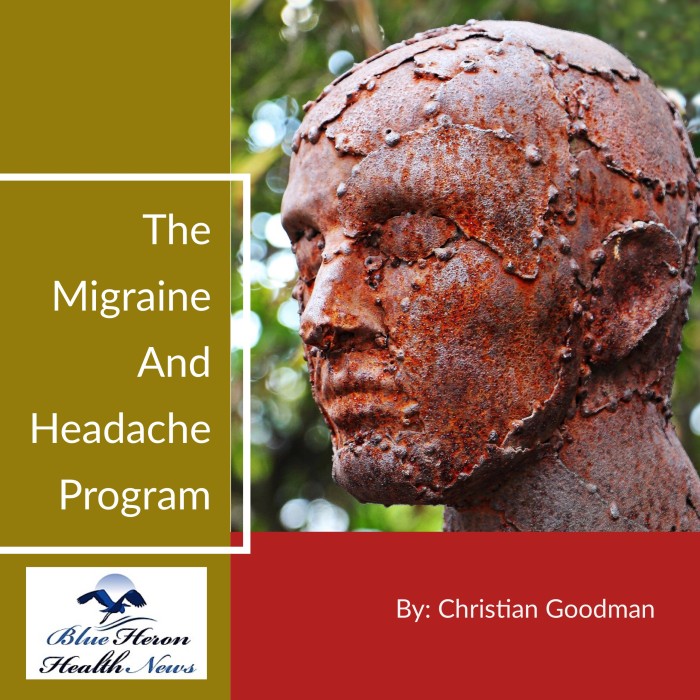
The Migraine And Headache Program By Christian Goodman This program has been designed to relieve the pain in your head due to any reason including migraines efficiently and effectively. The problem of migraine and headaches is really horrible as it compels you to sit in a quiet and dark room to get quick relief. In this program more options to relieve this pain have been discussed to help people like you.
How can menstrual migraines be managed?
Menstrual migraines are a subtype of migraine headaches that occur in relation to a woman’s menstrual cycle. They typically arise due to hormonal fluctuations, particularly the drop in estrogen levels that occurs just before menstruation. Managing menstrual migraines can be challenging, but there are several strategies that can be employed to reduce their frequency, severity, and impact. These strategies encompass both pharmacological and non-pharmacological approaches, tailored to the individual’s specific symptoms and health needs. Here’s an in-depth exploration of how menstrual migraines can be managed:
1. Understanding Menstrual Migraines
A. Definition and Timing Menstrual migraines are categorized into two types:
- Pure Menstrual Migraines: These occur exclusively during the perimenstrual period (two days before menstruation to three days after the start of menstruation) and at no other times.
- Menstrually Related Migraines: These occur during the perimenstrual period as well as at other times of the menstrual cycle.
The primary trigger for these migraines is believed to be the rapid drop in estrogen levels that occurs just before the onset of menstruation.
B. Symptoms Menstrual migraines typically present with similar symptoms to other types of migraines, including:
- Throbbing or pulsating head pain, often on one side
- Sensitivity to light, sound, or smell
- Nausea and vomiting
- Aura symptoms in some cases, such as visual disturbances
2. Pharmacological Management
A. Acute Treatment The goal of acute treatment is to alleviate symptoms during a migraine attack. Options include:
- Nonsteroidal Anti-Inflammatory Drugs (NSAIDs): Over-the-counter NSAIDs, such as ibuprofen or naproxen, can be effective in reducing pain and inflammation. They are often recommended to be taken at the onset of symptoms or as a preemptive measure if the timing of migraines is predictable.
- Triptans: These are prescription medications specifically used to treat migraines. Triptans, such as sumatriptan and rizatriptan, can be effective in relieving headache pain and associated symptoms. They work by constricting blood vessels and blocking pain pathways in the brain.
- Ergotamines: Another class of medications used to treat migraines, though less commonly prescribed than triptans due to potential side effects.
B. Preventive Treatment Preventive treatments aim to reduce the frequency and severity of migraines. They can be particularly useful for women with predictable menstrual migraines. Options include:
- Hormonal Therapy:
- Estrogen Supplements: Supplemental estrogen can be used to stabilize estrogen levels during the perimenstrual period. This can be administered via patches, gels, or pills. It is typically started a few days before the anticipated onset of menstruation and continued for several days after.
- Oral Contraceptives: Continuous or extended-cycle oral contraceptives can help regulate hormonal fluctuations and reduce the frequency of menstrual migraines. However, they may not be suitable for all women, particularly those with migraines with aura, due to an increased risk of stroke.
- GnRH Agonists: Gonadotropin-releasing hormone agonists can be used to suppress the menstrual cycle and thereby prevent menstrual migraines, though they are usually considered a last resort due to potential side effects.
- Non-Hormonal Preventive Medications:
- Beta-Blockers: Medications like propranolol can help prevent migraines by reducing the frequency of attacks.
- Antiepileptics: Drugs such as topiramate and valproate can be effective in preventing migraines.
- Antidepressants: Tricyclic antidepressants, such as amitriptyline, can help prevent migraines by modulating neurotransmitter levels.
C. Non-Pharmacological Interventions In addition to medication, several non-pharmacological approaches can help manage menstrual migraines:
- Lifestyle Modifications:
- Diet and Nutrition: Avoiding known dietary triggers (such as caffeine, alcohol, and certain foods) can help reduce the risk of migraines. Maintaining regular meal times and staying hydrated are also important.
- Exercise: Regular physical activity can help reduce the frequency and severity of migraines. However, it’s important to avoid overexertion, which can sometimes trigger migraines.
- Sleep Hygiene: Maintaining a consistent sleep schedule and ensuring adequate sleep can help prevent migraines.
- Stress Management:
- Relaxation Techniques: Practices such as deep breathing exercises, progressive muscle relaxation, and guided imagery can help reduce stress and tension, which are common migraine triggers.
- Mindfulness and Meditation: These practices can help manage stress and improve emotional well-being, potentially reducing the frequency of migraines.
- Cognitive-Behavioral Therapy (CBT): CBT can help individuals manage the psychological impact of migraines and develop coping strategies for dealing with stress and pain.
- Biofeedback: This technique involves using electronic monitoring devices to provide feedback on physiological functions, such as muscle tension and heart rate. By learning to control these functions, individuals can reduce the frequency and severity of migraines.
- Acupuncture: Some studies suggest that acupuncture can help reduce the frequency and intensity of migraines, though more research is needed to fully understand its efficacy.
D. Herbal and Nutritional Supplements Several herbal and nutritional supplements have been suggested for migraine prevention, though their efficacy and safety should be discussed with a healthcare provider:
- Magnesium: Some evidence suggests that magnesium supplementation can help prevent migraines, particularly in individuals with magnesium deficiency.
- Riboflavin (Vitamin B2): High-dose riboflavin has been shown to reduce the frequency of migraines in some studies.
- Coenzyme Q10: This supplement has been suggested to help prevent migraines, though more research is needed.
- Butterbur and Feverfew: These herbal supplements have been used for migraine prevention, but concerns about safety and efficacy mean they should be used with caution.
3. Monitoring and Individualized Care
A. Tracking Migraine Patterns Keeping a detailed diary of migraine attacks, including their timing, severity, associated symptoms, and potential triggers, can help in identifying patterns and tailoring treatment. This is especially useful for predicting menstrual migraines and planning preventive measures.
B. Regular Medical Consultation Regular consultations with a healthcare provider are essential for managing menstrual migraines effectively. This includes monitoring the effectiveness of treatment, adjusting medications as needed, and addressing any side effects or complications.
C. Consideration of Comorbidities Women with menstrual migraines often have other comorbid conditions, such as anxiety, depression, or other chronic pain conditions. Addressing these comorbidities is crucial for comprehensive migraine management.
Conclusion
Managing menstrual migraines requires a multifaceted approach that includes both pharmacological and non-pharmacological strategies. By understanding the hormonal triggers and employing preventive and acute treatments, women can reduce the frequency, severity, and impact of migraines. Tailoring the treatment plan to the individual’s specific needs, monitoring migraine patterns, and maintaining regular consultations with healthcare providers are key components of effective migraine management. Additionally, lifestyle modifications, stress management, and, when appropriate, the use of supplements or complementary therapies can provide further support in managing this challenging condition.

The Migraine And Headache Program By Christian Goodman This program has been designed to relieve the pain in your head due to any reason including migraines efficiently and effectively. The problem of migraine and headaches is really horrible as it compels you to sit in a quiet and dark room to get quick relief. In this program more options to relieve this pain have been discussed to help people like you.